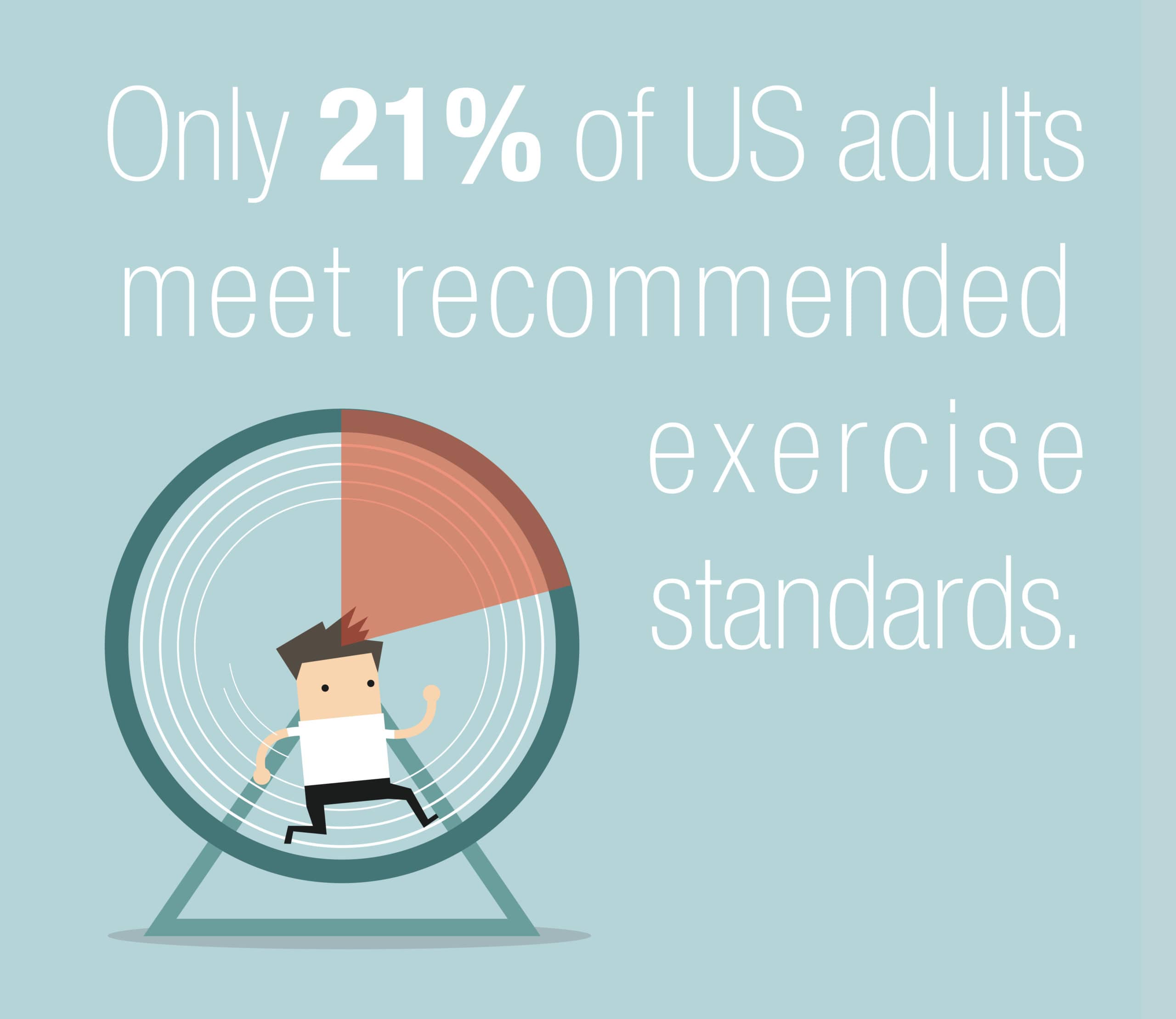Can Exercise Help Conquer Drug And Alcohol Addiction?
It’s common knowledge that exercise is good for you, but finding the time and motivation to work out can be a challenge. For those suffering from addiction, it’s especially difficult, as physical activity often takes a backseat to getting high. But what if exercise and addiction recovery goes hand in hand?
Can exercise help conquer substance abuse and addiction? Exercise could give you a natural high similar to the chemical one that drugs and alcohol provide. Current research shows it can, and millions of Americans can conquer addiction with it.
Want to exercise the mind and body to battle your addiction?! Contact us right away at 772-774-3872.
Exercise and Addiction Recovery Leads To Healthier Cravings
When a person is trying to overcome addiction, the mind and body crave the substance that is producing endorphins in the brain and creating the feeling of being high. Add to this the stress of daily life, and the cravings can reach unbearable levels. Vigorous exercise releases endorphins, causing you to feel a “runner’s high” — so exercise and addiction gets you the same sensation of euphoria. Although it may be less intense than what you experience with drugs or alcohol, the effects can be pleasurable both mentally and physically. In fact, one study of patients receiving treatment for substance abuse showed that exercise for addiction recovery can lead to a sense of accomplishment and increased confidence in staying sober.[1]

It’s common for an individual to become anxious or depressed when dealing with withdrawal, but exercise can foster healthy, addiction-free living when paired with medication assisted treatment and other forms of therapies. Here are other benefits of exercise in substance abuse treatment:[2]
- Reduce cravings and use
- Decrease the effectiveness of the drugs, thus lowering susceptibility to use and abuse
- Restore brain cells damaged by intense drug abuse
- Produce “neurological rewards” and boost self-esteem
- Reduce anxiety and stress
- Promote better sleep
- Improve thinking and provide a positive outlook
- Fill a void, offering structure and routine
- Exercise produces protective effects that serve as a constructive coping mechanism
But how can running, weightlifting and yoga have such a significant effect on the body and mind of someone coping with the substance abuse recovery process? It has much to do with the benefits that addiction recovery and exercise have on everybody.
How Can Physical Education and Sports Help in Eradicating Drugs?
A study published by the Scandinavian Journal of Public Health about exercise and addiction says that physical education and sports can help in treating addiction. It found that individuals who incorporated exercise into their rehab programs reported reduced intake of drugs and improved quality of life.[3] Participants said they felt more energetic, could breathe easier and felt better about their appearance.
Finding the Motivation in Exercise and Addiction Recovery
While exercising may be the last thing recovering individuals want to do, they may find it encouraging to know they’re not alone in their struggle with motivation. Statistics from the Centers for Disease Control and Prevention report that Americans are seriously lacking exercise. As of 2012, only about 21 percent of adults met the 2008 Physical Activity Guidelines, which recommends at least 150 minutes of moderate-intensity aerobic activity every week.[4]

While exercise is not enjoyable for everyone, it can be used as a tool to help build (or rebuild) a healthy life. It’s even been shown to deter the use and abuse of illicit drugs, as evidenced by a 2011 study published in Frontiers in Psychiatry[5]. Similarly, results from a National Institute on Drug Abuse survey indicated that high school students who exercise regularly are less likely than sedentary teens to smoke cigarettes or abuse marijuana.[6] The relationship between exercise and addiction, however, may be indirect. Perhaps those who exercise tend to make healthier choices in general. The initiation of drug or alcohol abuse may be countered by the support of like-minded exercise enthusiasts, friends and family; other social aspects of engaging in consistent physical activities; and by the time management skills that accompany the activities.
Still, it may simply be that exercise and physical activities serve as a substitute. In addition to the time spent at work or school, staying active feeds the brain, giving you something healthy to focus on. The same can be said for those in recovery, with exercise helping to alleviate the symptoms of withdrawal. In essence, exercise and addiction relation says that when you’re focused on your next set of push-ups, you’re less likely to be focused on your next “fix.”
To take a closer look at the exercise and addiction theory, scientists injected rats with substances like alcohol, morphine or amphetamines and found that those in a cage with an exercise wheel tapped the drug-dispensing lever far less often than the non-exercisers.[7] Two possible conclusions can be derived from the results. The exercise became an alternative to the drugs and alcohol, making the subjects less susceptible to addiction or they replaced one pleasurable activity with another when the endorphins kicked in.
Different Exercises, Different Effects
Like drug or alcohol addiction treatments, different exercises affect the mind and body differently. One activity may suit you better than another, so it’s best to experiment with many options to know the benefits of exercise for you. You may even find that a combination of the following types of exercise and addiction recovery is right for you:
Walking/Hiking
Studies show that the Great Outdoors can increase levels of dopamine during addiction treatment and a brisk 15-minute walk can help fight cravings when they arise.[8]
Yoga
Many rehab facilities include yoga as part of recovery programs, and for good reason. Less intense than some other forms of physical exercise, yoga sends you into a state of meditation that gives a lot of mental health benefits including alleviating anxiety and stress, which can trigger a relapse.
Strength Training
Cardio exercises like running seem to get the most fanfare, but lifting weights also helps you recover from substance use disorders. Weight training can help improve the body’s sleep cycle over time, which is beneficial to many in addiction recovery who suffer from insomnia.
Team Sports
Shooting hoops with some friends provides more than a good workout. The camaraderie and competition can aid long-term recovery and better well being, giving these individuals a way to integrate back into society.
Using exercise and addiction treatments hand in hand is likely to go a long way in decreasing substance use disorder. Many alcohol and drug addiction recovery centers recognize this and incorporate exercise and fitness into their substance abuse treatment programs. With a personalized fitness plan offered by addiction treatment centers, recovering individuals are more likely to have success during substance abuse treatment and maintain a healthy exercise habit once they re-enter society.
At Behavioral Health Centers, we understand the toll that addiction takes on the body and mind. Our programs incorporate regular exercise and addiction recovery to empower you to avoid and prevent relapse. If you or someone you know is struggling with substance abuse, contact us today at 772-774-3872.
- https://www.ncbi.nlm.nih.gov/pmc/articles/PMC3224086/
- https://www.ncbi.nlm.nih.gov/pubmed/21953518
- https://journals.sagepub.com/doi/full/10.1177/1403494814561819
- https://health.gov/paguidelines/guidelines/adults.aspx
- https://journal.frontiersin.org/article/10.3389/fpsyt.2011.00082/full
- https://www.drugabuse.gov/news-events/nida-notes/2009/10/lower-rates-cigarette-marijuana-smoking-among-exercising-teens
- https://www.ncbi.nlm.nih.gov/pubmed/21953518
- https://www.ncbi.nlm.nih.gov/pubmed/18835411







